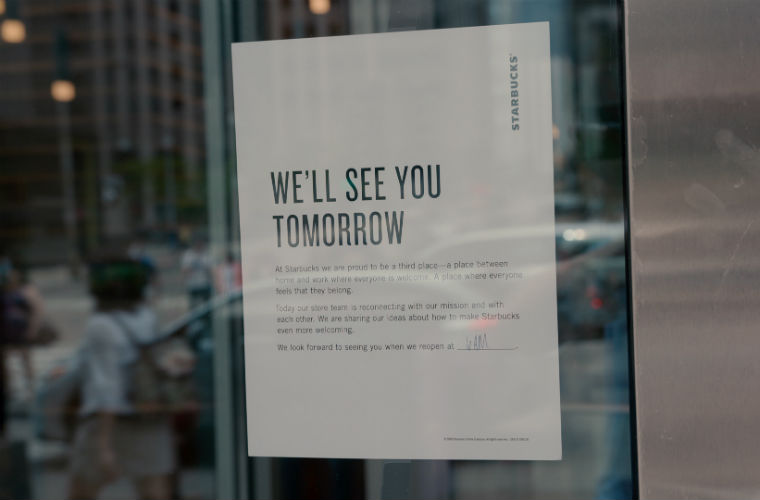Training
Starbucks Shuts Down to Give Workers Anti-Bias Training
By Rocio Villasenor
May. 29, 2018
Dozens of Starbucks customers were caught off guard by the mandatory half-day unconscious bias training for employees May 29 that shut down some 8,000 company-owned locations nationwide.
Some tried to open the closed doors at a Starbucks on Michigan Avenue in Chicago; others said they forgot the training was the day following Memorial Day as they read the “See you tomorrow” signs posted at the store.
One Starbucks customer in Chicago who asked not to be named had forgotten the closure was May 29 but knew about the mandatory training. She said the training is good for employees, although she was unsure if all companies should provide a similar training.
“It depends [if the training is] constructive and productive. [The exercises] during the training should focus on the systems of oppression,” she added.
Another customer visiting Chicago from New York, who also asked not to be named, said the training sounded like a “public relations stunt.” She added that she respects Starbucks more than before for doing this. “At least they are doing something,” she added.
The mandatory unconscious bias training comes after two African American males were arrested at a Philadelphia Starbucks for trespassing in mid-April.
According to Starbucks Executive Chairman Howard Schultz in an open letter to customers posted the day of training, the manager at the Philadelphia store had called police a few minutes after the two men arrived and sat waiting for a friend. The two men had not purchased anything, which according to company policy, meant that they were not customers.
Since then Starbucks has changed their policy to allow people to use their restrooms and spend time in stores.
“This incident has prompted us to reflect more deeply on all forms of bias, the role of our stores in communities and our responsibility to ensure that nothing like this happens again at Starbucks,” said Schultz.
The training will be provided to 175,000 employees, according to Schultz. They will be “sharing life experiences, hearing from others, listening to experts, reflecting on the realities of bias in our society and talking about how all of us create public spaces where everyone feels like they belong-because they do.”
Elena Richards, U.S. Minority Initiatives and Talent Management Leader for the Office of Diversity at global consultancy PwC, who could not speak specifically to Starbucks’ training, said unconscious bias training should be mandatory as it educates companies and gives organizations a step in the right direction.
“[People] typically rely on their gut, [but unconscious bias education will help] make better future decisions [and show them] the blind spots used in everyday behavior,” Richards said.
The Starbucks employee training included an award-winning documentary titled, “You’re Welcome” by Stanley Nelson.
Starbucks has received help from multiple experts in the field and have stated that there is more training scheduled in the future.
Victor Espinoza, a recent former employee of Starbucks, who worked for the company for five years in two different locations, said in an e-mail interview he thought the training is good for employees.
“This is definitely something every employee should go through,” he said. “I believe that that this training should be given to everyone the moment they get hired to any company, but especially in customer service. They shouldn’t have to close because this training should’ve been given to everyone the moment they got hired with the company, but just to get everyone on the same page at this point it is necessary to close,” Espinoza added.
“I do respect Starbucks more because they admitted their mistake and are working to fix this issue in the company,” he said.
PwC’s Richards noted that unconscious bias education is about “building a muscle and more awareness.”
This story first appeared in Chief Learning Officer, a sister publication of Workforce. Rocio Villasenor is a Workforce intern. Comment below or email editors@workforce.com.
Schedule, engage, and pay your staff in one system with Workforce.com.
Recommended
Compliance
Minimum Wage by State (2024)federal law, minimum wage, pay rates, state law, wage law compliance
Staffing Management
4 proven steps for tackling employee absenteeismabsence management, Employee scheduling software, predictive scheduling, shift bid, shift swapping
Time and Attendance
8 proven ways to reduce overtime & labor costs (2023)labor costs, overtime, scheduling, time tracking, work hours
